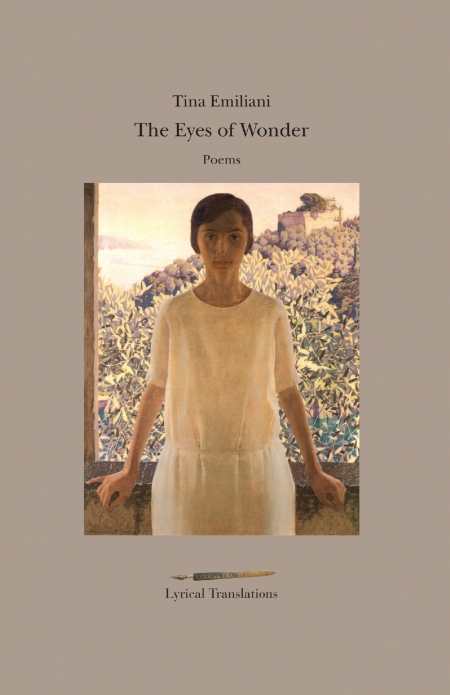
The Eyes of Wonder
In The Eyes of Wonder, poet Tina Emiliani offers much more than mere words: her pages are bursting with emotion, authenticity bleeds from the heart, soul, and memory of seventy years of life in her native Italy.
The seventy-two poems in this collection are beautifully translated into English, and they are set side-by-side with the original Italian verses, which were first collected and published as Gli occhi della meraviglia in 2005. While the translated text is moving and beautiful, it is when reading the Italian out loud that readers, even those who do not speak or understand her native language, will hear the lovely music in the lyrics of Emiliani’s poetry.
There are sweet and touching pieces about growing up with her grandmother in wartime and post-war Italy. Anyone ever attached to a grandmother will find their eyes and hearts welling up with warm memories as they read “The Voices,” “I With You,” or “Novecento.” Most every woman alive will appreciate passages that address the author’s coming of age: “I am even beautiful they say / my wicked fairy godmother has been merciful.”
There are many poems of love and sensuality in this collection, as well as musings on what it means to be young, rebellious, and filled with life. “Better the leap into the dark,” she writes in “The Rebel,” than “to find again / perhaps later / the light that was lost in time.” Better that, she adds, than “sleepless nights / to come / spent longing for / all that might have been / but was not / out of fear / out of that cursed fear / of losing the pennies / of tranquility / that make immobility / and inertia / comfortable.”
“I sell feelings / on the corners of life,” quips Emiliani in “The Little Cart.” Her feelings run the gamut from love to loss, from the hope and promise of youth to the fear and acceptance of growing older. “Blessed Daughter,” which relays her visit to her beloved father’s grave, will make any father tear up.
There are poems to her lovers and friends and presumed husband. They express loss and longing for those taken or gone away. There are sad musings of the loneliness and weariness of life nearing its end, such as this line: “I feel as if I am filling with sand / a jar whose bottom has been lost.”
Fortunately, Emiliani still has a lot of sand and a solid jar left to fill. In “The Time of the Courtyard,” she writes, “my thirst has never been quenched / and my body is withering / around a heart that still seeks / singing and music in a courtyard.”
May she share that “singing and music” in many more poems to come.
Reviewed by
Mark G. McLaughlin
Disclosure: This article is not an endorsement, but a review. The publisher of this book provided free copies of the book and paid a small fee to have their book reviewed by a professional reviewer. Foreword Reviews and Clarion Reviews make no guarantee that the publisher will receive a positive review. Foreword Magazine, Inc. is disclosing this in accordance with the Federal Trade Commission’s 16 CFR, Part 255.
